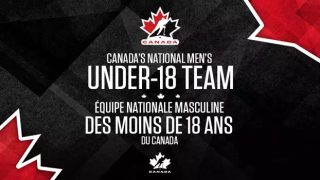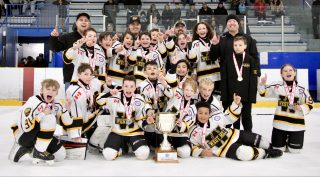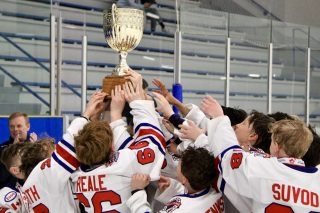Everyone makes mistakes – whether it’s in the classroom, the office, or at home, mistakes are a part of life.
Hockey in particular is no different.
It’s a very fast-paced sport, where players have to process what is going on around them and make split-second decisions that could impact the outcome of the game. Sometimes, those split-second decisions aren’t the best choice and it can result in the puck ending up in the back of your team’s net. It’s important that players learn at a young age that mistakes are okay, and that they are actually a valuable tool to learn and develop from.
 Operating as though mistakes are a negative with young hockey players can lead to a developed fear of failure. This can be paralyzing for players and can lead to tentative play, and ultimately more mistakes and missed opportunities in the future. Whether it’s a missed pass or missed coverage in front of the net, coaches and parents should use mistakes as a way for players to improve and grow.
Operating as though mistakes are a negative with young hockey players can lead to a developed fear of failure. This can be paralyzing for players and can lead to tentative play, and ultimately more mistakes and missed opportunities in the future. Whether it’s a missed pass or missed coverage in front of the net, coaches and parents should use mistakes as a way for players to improve and grow.
BUILD A CULTURE OF TRUST
Utilizing mistakes for development starts with coaching staff. Players should be encouraged to be creative on the ice and know when it’s okay to take risks versus making the safe play. Building a culture of trust and support with your team is key, as players will know they have support from their teammates and coaches, allowing them to push beyond of their comfort zone on the ice.
COMMUNICATION IS KEY
When a mistake is made, communication with the player is crucial. An open and honest conversation about what went wrong and how to correct and learn from it should take place. Communication and open dialogue allows the player to understand what went wrong and what steps they can take to not repeat it in the future. It’s also important that the player has the opportunity to share their perspective on the play. The conversation should focus on how ways to avoid the mistake next time versus placing blame or dwelling on what went wrong.
This approach is very significant when working with players who are very young. Young athletes have the most learning and development to do as players and will only learn by making those mistakes.
FINDING THE BALANCE
Balance, however, is important. Players should feel comfortable stepping outside their comfort zone to try new things, but they shouldn’t be careless or reckless on the ice. As players develop and mature, they should also understand there is always a time and place for the structure and systems the team has in place and when it’s okay within the system to utilize their creativity and skills.
MISTAKES MATURE
Coaches should understand that as the player matures, the types of mistakes will change. For example, an Under-9 player might have difficulty passing the puck to their teammates in motion, resulting in turnovers. A U14 defenceman, on the other hand, might read the play wrong and pinch down the boards at the wrong time, resulting in an odd-man rush the other way. Both examples are mistakes, although, both were made for different reasons. The U9 player is deficient in a skill and needs reps in making passes in motion. The U14 player read the play wrong and made an incorrect decision because of it. Talking to the player and reminding them about what to look for as the play develops is a way to correct their mistake.
It’s easy to forget that we are dealing with kids in minor hockey. These aren’t adults – they are children, youth, the next generation. They have lots of learning and growth to do and mistakes are a part of that development – arguably the most essential part of development in minor hockey. Mistakes are not the enemy and shouldn’t be treated as such. Mistakes can be used to learn, grow, build confidence, and ultimately be the very foundation for success.
Stay connected with the GTHL on Facebook, X (Formerly Twitter), Instagram, and TikTok.







